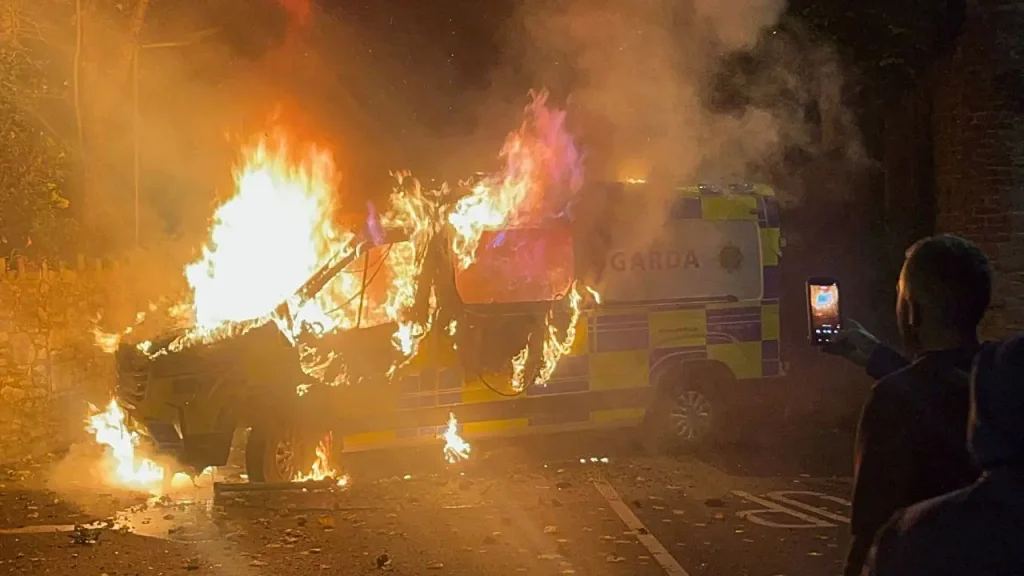Dublin Riots Erupt Following Alleged Assault of Young Girl in State Care
Tensions Flare as Protesters Clash with Police Outside Migrant Center
In the quiet Dublin suburb of Saggart, an outbreak of violence Tuesday night brought simmering social tensions to a boil. Protesters gathered outside the City West Hotel—a former luxury accommodation now housing some 2,000 migrants seeking international protection—after news spread of a disturbing incident: a 10-year-old Irish girl in state care had allegedly been sexually assaulted by a migrant facing deportation orders. What began as a demonstration quickly escalated as protesters set a police car ablaze and hurled glass bottles at officers. The chaotic scene forced Irish police to deploy nearly 300 officers to control the situation. Amid chants of “Get them out” and waving Irish flags, some protesters unleashed fireworks at police lines while others on horseback attempted to charge through barricades. The violence resulted in six arrests and injuries to at least one female officer, as authorities faced what Garda Commissioner Justin Kelly described not as peaceful protest but as “thuggery” and “a mob intent on violence against Gardaí.”
The Incident That Sparked Outrage Raises Questions About Child Protection
The circumstances surrounding the alleged assault have raised troubling questions about Ireland’s child protection services. According to officials, the young victim was under the care of Tusla, Ireland’s child protection agency, when she reportedly absconded from staff during a planned recreational outing in Dublin’s city center. How she subsequently encountered the suspect—described by Irish media as an African man in his 20s who had been ordered deported in March after failing his application for international protection—remains unclear. Irish Prime Minister Micheál Martin acknowledged the gravity of the situation Wednesday, stating that the girl “had not been protected by the state” and describing the circumstances as a matter of “deep concern.” The incident occurred on the grounds of Citywest, which the Irish government purchased in September for approximately $150 million, intending to transform it into a permanent migrant facility despite local opposition.
Ireland’s Immigration Debate Intensifies Amid Series of Violent Incidents
This latest unrest exists within a broader context of escalating tensions around immigration in Ireland. The country has experienced a significant shift in public sentiment following several high-profile violent incidents involving foreign nationals. In November 2023, Dublin witnessed severe riots after three young children were stabbed outside a school, allegedly by an Algerian-born suspect who had become an Irish citizen. The riots resulted in widespread property damage, vehicle fires, and confrontations with police. More recently, a 17-year-old Ukrainian asylum seeker was murdered just days after arriving in Ireland, with a Somalian youth, also in asylum care, charged with the crime. In another case that has fueled public concern, a foreign national experiencing homelessness was arrested for the alleged murder of an 89-year-old Irish woman. These incidents have collectively contributed to growing anxiety about immigration policies and integration challenges in a country historically known for its outward migration rather than as a destination.
Government Response and Political Implications
The Irish government finds itself walking a precarious line between maintaining order, addressing legitimate concerns about immigration policy, and preventing xenophobic reactions. Prime Minister Martin swiftly condemned the violence against police, stating there was “no justification for the vile abuse against them.” However, his acknowledgment that the state failed to protect the young victim suggests recognition of systemic issues that extend beyond immigration alone. The timing of these events is particularly significant as Ireland prepares for presidential elections on Friday. Immigration has become a central theme in political discourse, with candidates positioning themselves on various points of the spectrum regarding Ireland’s approach to asylum seekers and integration policies. The violence at Citywest has thrust these debates further into the spotlight, potentially influencing voter sentiment in what was already anticipated to be a contentious election.
The Citywest Controversy: Symbol of Ireland’s Immigration Challenges
The Citywest Hotel itself has become emblematic of Ireland’s evolving—and sometimes contentious—relationship with immigration. Once a luxury resort hosting golf tournaments and corporate conferences, its transformation into a migrant housing center represents the visible manifestation of policy changes that some Irish citizens have struggled to accept. The government’s recent purchase of the property for permanent use as a migrant facility, despite local protests, highlights the tension between humanitarian obligations and community concerns. With approximately 2,000 migrants currently housed at the location, it stands as one of Ireland’s largest such facilities. The concentration of asylum seekers in specific areas has raised questions about integration strategies, resource allocation, and the long-term vision for accommodating those seeking international protection. Tuesday’s protest, while condemned for its violent methods, reflects broader anxieties about rapid demographic changes in a society traditionally viewed as culturally homogeneous.
Looking Forward: Balancing Security, Integration, and Social Cohesion
As Ireland navigates these turbulent waters, policymakers face the challenge of addressing legitimate security concerns while preventing the scapegoating of entire communities based on the actions of individuals. The alleged assault of a vulnerable child in state care points to failures in multiple systems—not just immigration enforcement, but also child protection protocols and social services coordination. The incident raises difficult questions about vetting procedures, supervision of vulnerable individuals, and information sharing between agencies. Moving forward, Ireland’s approach will likely require a delicate balance: enforcing immigration laws and deportation orders more consistently, improving protection for vulnerable citizens, while also developing more effective integration programs for those granted permission to stay. As the country prepares for its presidential election, these issues will undoubtedly influence not just immediate voting decisions but also Ireland’s longer-term approach to questions of national identity, cultural integration, and societal cohesion in an increasingly diverse population.













